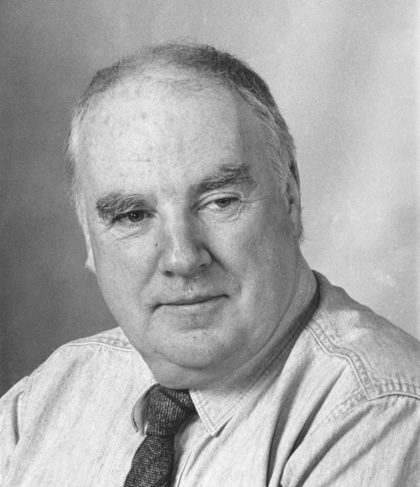Troy Kennedy Martin, screenwriter

b. 15/02/1932; d. 15/09/2009
That Troy Kennedy Martin is best known for Z Cars, The Italian Job and Edge of Darkness is proof of his versatility as a screenwriter. Yet in a career spanning six decades, these iconic works represent only the tip of an iceberg, with much of his television work unknown or lost and many scripts, for film and TV, unproduced. His first TV play, Incident at Echo Six (1958), and a novel, Beat on a Damask Drum (1959), were informed by his National Service experience in Cyprus. Although he thought he was ‘slumming it’ in television and was really destined to be a novelist, in his time spent as a scriptwriter at the BBC in the late 1950s and early 60s he showed a considerable facility for screenwriting, whether adapting other people’s work or writing his own original scripts.
The experience in the BBC Script Department also radicalised him. Working alongside John McGrath, John Hopkins, Roger Smith, James MacTaggart, Tony Garnett and Ken Loach, he was at the cutting edge of new developments in television drama, creating Storyboard (1961), a series of short experimental plays, writing Nats Go Home! (1964), an influential manifesto against naturalism in TV drama, and collaborating with McGrath on the experimental series Diary of a Young Man (1964), directed by Ken Loach and Peter Duguid.
Z Cars (1962-78) was also developed in this period, but the original intention to use the form of the police series to explore the lives of ordinary people in Liverpool was eroded as viewers became more interested in the policemen who featured every week. Characterisation was always one of Kennedy Martin’s strengths, and with Barlow, Watt, Lynch and Fancy Smith, he created some of the police genre’s more memorable characters. Z Cars rode the new wave of social realism that was popular at the time; but humour was an important part of its appeal – and became a defining characteristic of Kennedy Martin’s work, never more so than in his feature-film debut The Italian Job (1969), which made him one of the highest-paid British writers in Hollywood. Humour was also prominent in his wartime caper movie Kelly’s Heroes (1970), and in his scripts for The Sweeney (1975-78), the police series created by his brother Ian.
Less well-known are the sitcom written for London Weekend Television, If It Moves, File It (1970), and the 16 episodes he wrote for Weavers Green (1966) and Parkin’s Patch (1969-70) under the pseudonym of Tony Marsh (“I tried to think of the most dull and boring name I could”). Similarly overlooked is Fear of God (1980), a serial about a religious cult written for Thames TV’s Armchair Thriller series. But it was Reilly: Ace of Spies (1983), the Angus Wilson adaptation The Old Men at the Zoo (1983) and the nuclear thriller Edge of Darkness (1985) that represent the apex of his television career. In the latter, the Stetson-wearing, Rolls Royce-driving CIA agent Darius Jedburgh (“with Reagan in the White House we get to keep a higher profile”) was one of Kennedy Martin’s greatest creations, a perfect foil for the dour Yorkshire policeman Ronald Craven, memorably played by Bob Peck. The scene in which Jedburgh, on returning from El Salvador, upends his golf bag to reveal an automatic rifle, grenades and empty whisky bottles, before sitting down to watch Come Dancing on TV, perfectly encapsulates the character’s maverick nature. (The fact that Edge of Darkness has just been remade, 25 years on, as a big-budget Hollywood feature is testament to its enduring reputation.)
Kennedy Martin’s career after Edge of Darkness suffered from an increasing conservatism in the TV industry. Often unwilling to compromise, and prone to prevaricate over endings, he saw only four of the many projects he worked on produced: Red Heat (1988), co-written with director Walter Hill; Hostile Waters (1997), based on a true-life story about a collision between American and Russian submarines; Bravo Two Zero (1999), co-written with Andy McNab; and Red Dust (2005), adapted from Gillian Slovo’s novel. Broken Light, a long-cherished project about global warming dating back to the late 1980s, was delivered shortly before his death.
Lez Cooke
